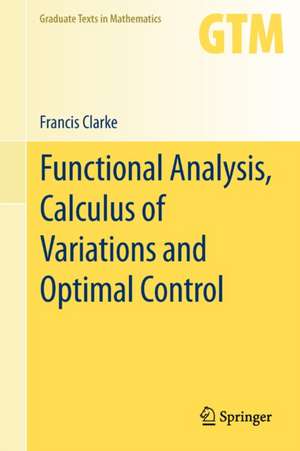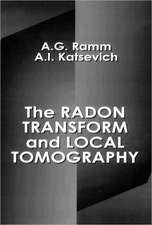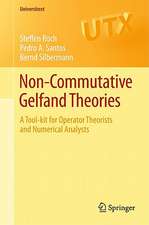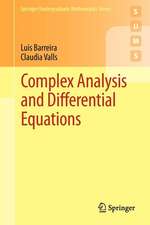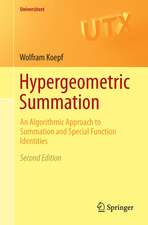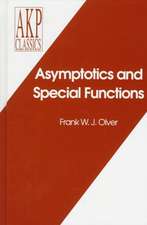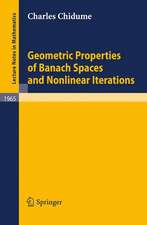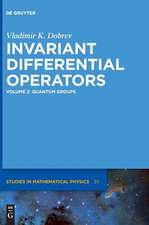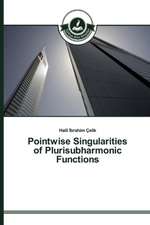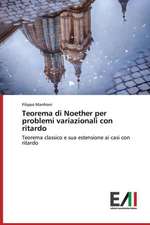Functional Analysis, Calculus of Variations and Optimal Control: Graduate Texts in Mathematics, cartea 264
Autor Francis Clarkeen Limba Engleză Hardback – 6 feb 2013
This book provides a thorough introduction to functional analysis and includes many novel elements as well as the standard topics. A short course on nonsmooth analysis and geometry completes the first half of the book whilst the second half concerns the calculus of variations and optimal control. The author provides a comprehensive course on these subjects, from their inception through to the present. A notable feature is the inclusion of recent, unifying developments on regularity, multiplier rules, and the Pontryagin maximum principle, which appear here for the first time in a textbook. Othermajor themes include existence and Hamilton-Jacobi methods.
The many substantial examples, and the more than three hundred exercises, treat such topics as viscosity solutions, nonsmooth Lagrangians, the logarithmic Sobolev inequality, periodic trajectories, and systems theory. They also touch lightly upon several fields of application: mechanics, economics, resources, finance, control engineering.
Functional Analysis, Calculus of Variations and Optimal Control is intended to support several different courses at the first-year or second-year graduate level, on functional analysis, on the calculus of variations and optimal control, or on some combination. For this reason, it has been organized with customization in mind. The text also has considerable value as a reference. Besides its advanced results in the calculus of variations and optimal control, its polished presentation of certain other topics (for example convex analysis, measurable selections, metric regularity, and nonsmooth analysis) will be appreciated by researchers in these and related fields.
| Toate formatele și edițiile | Preț | Express |
|---|---|---|
| Paperback (1) | 514.48 lei 6-8 săpt. | |
| SPRINGER LONDON – 8 feb 2015 | 514.48 lei 6-8 săpt. | |
| Hardback (1) | 549.03 lei 6-8 săpt. | |
| SPRINGER LONDON – 6 feb 2013 | 549.03 lei 6-8 săpt. |
Din seria Graduate Texts in Mathematics
-
 Preț: 337.45 lei
Preț: 337.45 lei -
 Preț: 383.85 lei
Preț: 383.85 lei -
 Preț: 402.87 lei
Preț: 402.87 lei - 17%
 Preț: 528.66 lei
Preț: 528.66 lei - 17%
 Preț: 398.97 lei
Preț: 398.97 lei -
 Preț: 355.82 lei
Preț: 355.82 lei -
 Preț: 412.24 lei
Preț: 412.24 lei -
 Preț: 404.47 lei
Preț: 404.47 lei -
 Preț: 289.88 lei
Preț: 289.88 lei - 17%
 Preț: 365.79 lei
Preț: 365.79 lei - 17%
 Preț: 359.45 lei
Preț: 359.45 lei - 15%
 Preț: 488.70 lei
Preț: 488.70 lei -
 Preț: 381.92 lei
Preț: 381.92 lei - 13%
 Preț: 357.75 lei
Preț: 357.75 lei -
 Preț: 407.88 lei
Preț: 407.88 lei - 13%
 Preț: 352.49 lei
Preț: 352.49 lei - 13%
 Preț: 358.86 lei
Preț: 358.86 lei - 13%
 Preț: 393.48 lei
Preț: 393.48 lei - 11%
 Preț: 351.00 lei
Preț: 351.00 lei - 17%
 Preț: 359.58 lei
Preț: 359.58 lei -
 Preț: 350.45 lei
Preț: 350.45 lei -
 Preț: 399.74 lei
Preț: 399.74 lei -
 Preț: 498.91 lei
Preț: 498.91 lei - 20%
 Preț: 571.26 lei
Preț: 571.26 lei - 15%
 Preț: 546.59 lei
Preț: 546.59 lei -
 Preț: 498.69 lei
Preț: 498.69 lei - 15%
 Preț: 354.39 lei
Preț: 354.39 lei -
 Preț: 313.10 lei
Preț: 313.10 lei - 13%
 Preț: 427.39 lei
Preț: 427.39 lei - 17%
 Preț: 363.59 lei
Preț: 363.59 lei -
 Preț: 340.18 lei
Preț: 340.18 lei - 17%
 Preț: 364.47 lei
Preț: 364.47 lei - 17%
 Preț: 366.47 lei
Preț: 366.47 lei - 17%
 Preț: 366.06 lei
Preț: 366.06 lei -
 Preț: 247.59 lei
Preț: 247.59 lei - 17%
 Preț: 367.70 lei
Preț: 367.70 lei - 13%
 Preț: 356.79 lei
Preț: 356.79 lei - 17%
 Preț: 398.78 lei
Preț: 398.78 lei - 17%
 Preț: 398.51 lei
Preț: 398.51 lei - 17%
 Preț: 496.63 lei
Preț: 496.63 lei - 15%
 Preț: 482.97 lei
Preț: 482.97 lei -
 Preț: 401.99 lei
Preț: 401.99 lei - 17%
 Preț: 366.56 lei
Preț: 366.56 lei - 20%
 Preț: 449.73 lei
Preț: 449.73 lei -
 Preț: 380.34 lei
Preț: 380.34 lei - 17%
 Preț: 427.27 lei
Preț: 427.27 lei -
 Preț: 358.07 lei
Preț: 358.07 lei
Preț: 549.03 lei
Preț vechi: 645.92 lei
-15% Nou
Puncte Express: 824
Preț estimativ în valută:
105.05€ • 109.69$ • 86.95£
105.05€ • 109.69$ • 86.95£
Carte tipărită la comandă
Livrare economică 04-18 aprilie
Preluare comenzi: 021 569.72.76
Specificații
ISBN-13: 9781447148197
ISBN-10: 1447148193
Pagini: 608
Ilustrații: XIV, 591 p. 24 illus., 8 illus. in color.
Dimensiuni: 155 x 235 x 38 mm
Greutate: 1.02 kg
Ediția:2013
Editura: SPRINGER LONDON
Colecția Springer
Seria Graduate Texts in Mathematics
Locul publicării:London, United Kingdom
ISBN-10: 1447148193
Pagini: 608
Ilustrații: XIV, 591 p. 24 illus., 8 illus. in color.
Dimensiuni: 155 x 235 x 38 mm
Greutate: 1.02 kg
Ediția:2013
Editura: SPRINGER LONDON
Colecția Springer
Seria Graduate Texts in Mathematics
Locul publicării:London, United Kingdom
Public țintă
GraduateCuprins
Normed Spaces.- Convex sets and functions.- Weak topologies.- Convex analysis.- Banach spaces.- Lebesgue spaces.- Hilbert spaces.- Additional exercises for Part I.- Optimization and multipliers.- Generalized gradients.- Proximal analysis.- Invariance and monotonicity.- Additional exercises for Part II.- The classical theory.- Nonsmooth extremals.- Absolutely continuous solutions.- The multiplier rule.- Nonsmooth Lagrangians.- Hamilton-Jacobi methods.- Additional exercises for Part III.- Multiple integrals.- Necessary conditions.- Existence and regularity.- Inductive methods.- Differential inclusions.- Additional exercises for Part IV.
Recenzii
From the reviews:
“The book is composed of four parts … . A nice feature of this graduate-level textbook is that the book is sprinkled with a number of exercises including additional ones for each part of the book, notes, solutions, and hints and hence ideally suitable for adaptation for a first/second level graduate course in control theory. … the book, written by a well-known expert in control theory, is an excellent lasting addition to the field of calculus of variations and optimal control.” (D. Subbaram Naidu, Amazon.com, May, 2013)
“Each of the four parts the book, or selections of chapters, can be used for courses on different topics. … Written by an expert in the field, with outstanding contributions to nonsmooth analysis, calculus of variations and optimal control, the present book, written in a live but rigorous style, will help the interested people to a smooth approach and a better understanding of this difficult subject in mathematics, both pure and applied, which is optimal control.” (S. Cobzaş, Studia Universitatis Babes-Bolyai, Mathematica, Vol. 58 (2), 2013)
"This new book stands out because it combines, within a single publication, treatment of major themes of optimal control theory with coverage of areas of functional analysis, convex analysis, the calculus of variations and nonsmooth analysis oriented towards aspects of these subjects having special relevance to control. But to describe it as a self-contained text book for a graduate level course in optimal control theory is to sell it short. This is because the parts preceding the optimal control chapters, on functional analysis, optimization and nonsmooth analysis, and the calculus of variations all to a large extent stand alone, and so it provides suitable material for several courses, besides one on optimal control."
"The final section covers, for the first time in book form, the most recent important advances in the theory of necessary conditions."
"The quality of exposition is extremely high. Great emphasis has been placed on accessibility, with much motivating discussion and a very large number of exercises and worked examples."
Reviewed by Richard B. Vinter (Mathematical Reviews)
In summary, this book is a monumental work collecting an impressive amount of technical material ranging from historical results of calculus of variations to modern advances in nonsmooth analysis and optimization. As such, the book as a whole cannot be considered as a textbook: its scope is too broad, and some developments (especially in Part IV) seem to be too technical. However, on pages ix-x the author suggests various roadmaps for course adoption, at various levels, based on his own teaching experience. Moreover, the author's lively writing style very often provides additional insight and intuition behind the key technical concepts. This is why, in this reviewer's opinion, this book is a central, and unprecedented reference in the field of optimization and optimal control.
Didier Henrion (LASS, Toulouse)
“The book is composed of four parts … . A nice feature of this graduate-level textbook is that the book is sprinkled with a number of exercises including additional ones for each part of the book, notes, solutions, and hints and hence ideally suitable for adaptation for a first/second level graduate course in control theory. … the book, written by a well-known expert in control theory, is an excellent lasting addition to the field of calculus of variations and optimal control.” (D. Subbaram Naidu, Amazon.com, May, 2013)
“Each of the four parts the book, or selections of chapters, can be used for courses on different topics. … Written by an expert in the field, with outstanding contributions to nonsmooth analysis, calculus of variations and optimal control, the present book, written in a live but rigorous style, will help the interested people to a smooth approach and a better understanding of this difficult subject in mathematics, both pure and applied, which is optimal control.” (S. Cobzaş, Studia Universitatis Babes-Bolyai, Mathematica, Vol. 58 (2), 2013)
"This new book stands out because it combines, within a single publication, treatment of major themes of optimal control theory with coverage of areas of functional analysis, convex analysis, the calculus of variations and nonsmooth analysis oriented towards aspects of these subjects having special relevance to control. But to describe it as a self-contained text book for a graduate level course in optimal control theory is to sell it short. This is because the parts preceding the optimal control chapters, on functional analysis, optimization and nonsmooth analysis, and the calculus of variations all to a large extent stand alone, and so it provides suitable material for several courses, besides one on optimal control."
"The final section covers, for the first time in book form, the most recent important advances in the theory of necessary conditions."
"The quality of exposition is extremely high. Great emphasis has been placed on accessibility, with much motivating discussion and a very large number of exercises and worked examples."
Reviewed by Richard B. Vinter (Mathematical Reviews)
In summary, this book is a monumental work collecting an impressive amount of technical material ranging from historical results of calculus of variations to modern advances in nonsmooth analysis and optimization. As such, the book as a whole cannot be considered as a textbook: its scope is too broad, and some developments (especially in Part IV) seem to be too technical. However, on pages ix-x the author suggests various roadmaps for course adoption, at various levels, based on his own teaching experience. Moreover, the author's lively writing style very often provides additional insight and intuition behind the key technical concepts. This is why, in this reviewer's opinion, this book is a central, and unprecedented reference in the field of optimization and optimal control.
Didier Henrion (LASS, Toulouse)
Textul de pe ultima copertă
Functional analysis owes much of its early impetus to problems that arise in the calculus of variations. In turn, the methods developed there have been applied to optimal control, an area that also requires new tools, such as nonsmooth analysis. This self-contained textbook gives a complete course on all these topics. It is written by a leading specialist who is also a noted expositor.
This book provides a thorough introduction to functional analysis and includes many novel elements as well as the standard topics. A short course on nonsmooth analysis and geometry completes the first half of the book whilst the second half concerns the calculus of variations and optimal control. The author provides a comprehensive course on these subjects, from their inception through to the present. A notable feature is the inclusion of recent, unifying developments on regularity, multiplier rules, and the Pontryagin maximum principle, which appear here for the first time in a textbook. Othermajor themes include existence and Hamilton-Jacobi methods.
The many substantial examples, and the more than three hundred exercises, treat such topics as viscosity solutions, nonsmooth Lagrangians, the logarithmic Sobolev inequality, periodic trajectories, and systems theory. They also touch lightly upon several fields of application: mechanics, economics, resources, finance, control engineering.
Functional Analysis, Calculus of Variations and Optimal Control is intended to support several different courses at the first-year or second-year graduate level, on functional analysis, on the calculus of variations and optimal control, or on some combination. For this reason, it has been organized with customization in mind. The text also has considerable value as a reference. Besides its advanced results in the calculus of variations and optimal control, its polished presentation of certain other topics (for example convex analysis, measurable selections, metric regularity, and nonsmooth analysis) will be appreciated by researchers in these and related fields.
This book provides a thorough introduction to functional analysis and includes many novel elements as well as the standard topics. A short course on nonsmooth analysis and geometry completes the first half of the book whilst the second half concerns the calculus of variations and optimal control. The author provides a comprehensive course on these subjects, from their inception through to the present. A notable feature is the inclusion of recent, unifying developments on regularity, multiplier rules, and the Pontryagin maximum principle, which appear here for the first time in a textbook. Othermajor themes include existence and Hamilton-Jacobi methods.
The many substantial examples, and the more than three hundred exercises, treat such topics as viscosity solutions, nonsmooth Lagrangians, the logarithmic Sobolev inequality, periodic trajectories, and systems theory. They also touch lightly upon several fields of application: mechanics, economics, resources, finance, control engineering.
Functional Analysis, Calculus of Variations and Optimal Control is intended to support several different courses at the first-year or second-year graduate level, on functional analysis, on the calculus of variations and optimal control, or on some combination. For this reason, it has been organized with customization in mind. The text also has considerable value as a reference. Besides its advanced results in the calculus of variations and optimal control, its polished presentation of certain other topics (for example convex analysis, measurable selections, metric regularity, and nonsmooth analysis) will be appreciated by researchers in these and related fields.
Caracteristici
A self-contained in-depth introduction to functional analysis and the related fields of optimal control and the calculus of variations that is unique in its coverage Written in a lively and engaging style by a leading specialist Includes a short course on optimization and nonsmooth analysis Gives complete proofs of advanced versions of the Pontryagin maximum principle that appear for the first time in a textbook Contains hundreds of exercises of an original nature, with solutions or hints in many cases Includes supplementary material: sn.pub/extras
